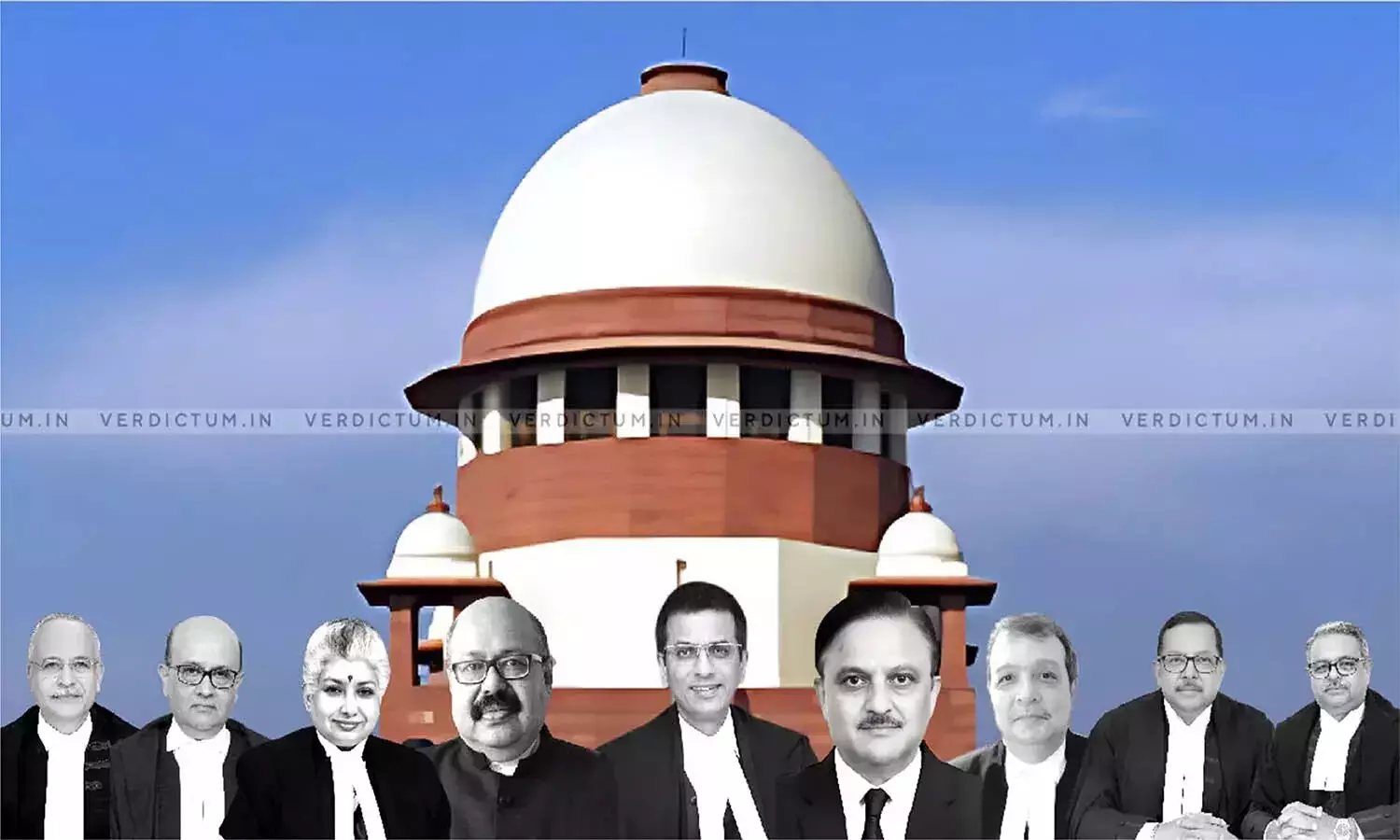
Federal Supremacy Of Parliament On Legislative Competence Can Only Be Resorted To When There Is An ‘Irreconcilable Direct Conflict’ Between Entries In Different Lists: SC
 |
|The Supreme Court reiterated that the federal supremacy of Parliament on legislative competence can only be resorted to when there is an ‘irreconcilable direct conflict’ between entries in different lists.
The Constitution Bench observed thus in a judgment today in which it overruled its 1990 Judgment in an 8:1 majority. Chief Justice DY Chandrachud, Justice Hrishikesh Roy, Justice Abhay S. Oka, Justice JB Pardiwala, Justice Manoj Misra, Justice Ujjal Bhuyan, Justice Satish Chandra Sharma, and Justice Augustine George Masiah overruled the Judgment, while Justice BV Nagarathna gave a dissenting opinion.
It was observed, “The devices of language used in the Seventh Schedule prevent the overlap between entries in various Lists. Now, what of the instances where there is an overlap between provisions in different entries but the Constitution does not use a device to resolve it? It must be recalled that the federal supremacy of Parliament on legislative competence can only be resorted to when there is an ‘irreconcilable direct conflict’ between entries in different lists. It is crucial to note the difference between ‘overlap’ and ‘conflict’. An overlap occurs when two or more things or fields partially intersect. However, a conflict occurs when two or more entries operate in the exactly same field. Courts while dealing with an overlap of legislative entries must endeavour to diminish the overlap and not enhance it by including it in the field of conflict. The federal supremacy accorded to Parliament ticks in at the stage of conflict.”
Senior Advocates Dinesh Dwivedi, Arvind P Datar and V. Giri represented the appellants, while Attorney General R Venkatramani and Solicitor General Tushar Mehta appeared for the respondent.
The Dispute was regarding the regulation of industrial alcohol, which was not intended for human consumption. Under Entry 8 of the State List, States have the power to legislate on the manufacture, possession, transport, purchase, and sale of "intoxicating liquors." However, Entry 52 of the Union List and Entry 33 of the Concurrent List gave the Centre regulatory authority over industries declared by Parliament to be in the public interest.
While the Concurrent List allows both Parliament and state legislatures to enact laws on shared subjects, central laws take precedence over state laws in cases of conflict. This case, which has been ongoing for decades, was initially decided in 1997 by a seven-judge bench, which ruled in favour of the Centre, affirming its regulatory power over the production of industrial alcohol.
The Supreme Court set aside its 1990 decision in Synthetic & Chemicals Ltd. Etc v. State Of U.P. holding, “The term 'intoxicating liquor' includes the production, manufacture and distribution of liquor or alcohol that doesn't traditionally cause intoxication and will also be considered as intoxicating liquor...a common thread between alcohol, opium and drugs is that they obnoxious substances and can be used as raw material also.”
The Bench observed, that the federal balance of the distribution of legislative powers between the Union and the States rests on the interpretation of the phrase “notwithstanding” in Clause (1) of Article 246 of the Constitution and “subject to” in Clause (3) of Article 246.
“It is more than clear that the phrases provide predominance to Parliament over State Legislatures. The federal balance lies not on the recognition that the Constitution grants Parliament predominant legislative power but on the identification of the scope of such predominance. The scope of the non-obstante clause in Article 246(1) and the subjugation clause in Article 246(3) must not be interpreted in isolation but along with the substantive provisions of the clauses. Clause (1) of Article 246 grants Parliament the “exclusive power” to enact laws with respect to matters in List I,” the Court stated.
Explaining the purpose of the non-obstante and subjugation clause, the Court noted that it was crucial to note that Clause (1) of Article 246 stipulated that the power of Parliament to make laws with respect to entries in List I was “notwithstanding” not just the power to make laws with respect to matters in the Concurrent list but also the power to make laws with respect to matters in the State List.
“A combined reading of the non-obstante clause and the subjugation clause along with the use of the phrase “exclusive power” means only one thing, that when there is a conflict between the entries in List I and List II, the power of Parliament supersedes,” the Bench remarked.
Cause Title: State of U.P. & Ors. v. M/S Lalta Prasad Vaish and Sons (Neutral Citation: 2024 INSC 812)
Appearance:
Appellants: Senior Advocates Dinesh Dwivedi, Arvind P Datar and V. Giri; AOR Samar Vijay Singh; C.K. Sasi, Pankaj Bhagat and Akshat Kumar; Advocates Sukhdev Sharma, Rahul Unnikrishnan, Prateek Dwivedi, Azeem A. Dost, Vikas Singh Jangra, Manish Kumar, Krishnam Mishra, Pawan Kishore Singh, Nishant Singh, Meena K Poulose, Harsher Sunder, Nihar Dharmadhikari, Rao Vishwaja, Rahul Narang, et al
Respondent: Attorney General R Venkatramani; Solicitor General Tushar Mehta; Senior Advocates Abhimanyu Bhandari, Rajiv Dutta, S. Nandakumar, Dhruv Agrawal, J.S.Attri, Saurabh Mishra, K N Balgopal, Amit Kumar, Balbir Singh and Jaideep Gupta; AOR Raj Bahadur Yadav, Mukesh Kumar Maroria, Samar Vijay Singh, Ambhoj Kumar Sinha, et al; Advocates Sonali Jain, Mukesh Kumar Singh, Raman Yadav, Kartikay Aggarwal, Abhishek Kumar Pandey, Chitvan Singhal, Ameyvikrama Thanvi, et al